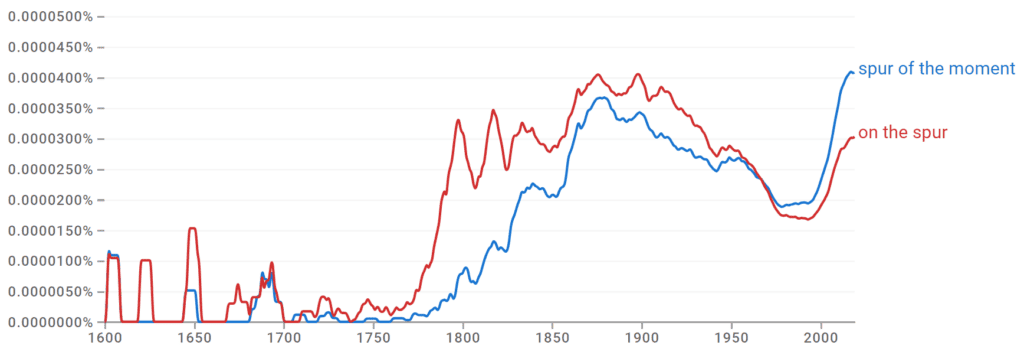Spur of the moment is an idiom that denotes an impulsive or sudden action. For instance, the phrase can be used in a sentence such as, “On the spur of the moment, I booked a cheap flight to New York to visit a friend,” indicating a decision made abruptly without pre-planning.
This idiom has its roots in horse riding, where a spur was used to urge a horse to move instantly. Its continued usage today highlights its effectiveness in conveying particular types of immediate, impromptu action.
In the English language, idioms, like spur of the moment, are phrases where the words together have a different meaning than their individual definitions. These metaphoric expressions enrich the texture of sentences and add depth to communication.
So, we will go into the deeper meaning, origin, and contemporary examples of the idiom spur of the moment.
Spur of the Moment Meaning

On the spur of the moment means to do something without advance planning or to do something on impulse. The expression suggests a spontaneous or unplanned action undertaken in the heat of the moment or without much deliberation.
Is Spur of the Moment Hyphenated?
The phrase spur of the moment is hyphenated when used as an adjective before the noun it modifies. This rule relates to compound adjectives to indicate that the words work together to explain or modify the noun.
Spur of the Moment Synonyms
- Impulsively
- Suddenly
- Unexpectedly
- On a whim
- Without prior planning
- In an instant
- Without hesitation
- On the fly
Using Spur of the Moment in Sentences
- On the spur of the moment, she booked a last-minute trip to Paris.
- It was a spur-of-the-moment decision; they spontaneously decided to go for a road trip, packing their bags and hitting the road immediately.
- Monica dyed her hair a vibrant color on the spur of the moment, wanting to try something new and exciting.
Spur of the Moment Origin

A spur is a tool used by horseback riders to apply additional pressure to the flanks of a horse while riding. They are judicial in their use but can elicit a more sensitive response from the horse when used properly. Spurs have been in use for thousands of years, and “to spur a horse” generally means to ask for more attention and speed.
This connotation has extended to a metaphorical use in the phrase on the spur, or at the spur, signifying “in great haste,” first used in the early 15th century.
As an example, there’s a line from a 1450 romance, “Merlin: or, the Early History of King Arthur“:
The Duke saugh [= saw] his peple come fleinge and the saisnes [= Saracens] after, that hem pursued harde at the spore.
The phrase spur of the moment emerged in the late 18th century and has since been associated with actions done impromptu or without prior planning.
One of the earliest recorded uses of this idiom is from Jackson’s Oxford Journal in July of 1784:
The Idea of Lord Ferrers, though probably set forward on the Spur of the Moment, looks at first as if it would lead to something worth attending—a Tax on Watches…
Let’s Review
The idiom spur of the moment describes actions or decisions made impulsively or spontaneously without much prior thought or planning. It highlights the idea of acting impulsively or taking advantage of an unexpected opportunity.
The use of the word spur in relation to hasty has been in use for over 500 years. Its extension to similar figurative uses through the years to highlight quick or impulsive decisions makes sense.
